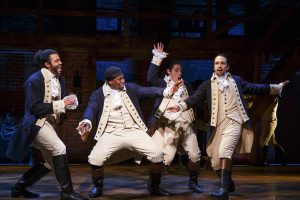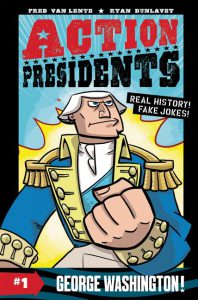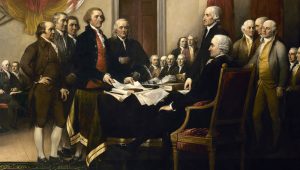From Hannah: Last year for the fourth of July, VoxPopcast recorded a show based on Captain America’s mythos and how it ties in with patriotism and nationalism. This year, I thought that we might want to consider the way that we’ve mythologized the “founders” of America to the point of superhero status. (I mean, some of them have gotten their own comic books.) The mythologization of these “Great Men” (George Washington, Benjamin Franklin, Thomas Jefferson, Alexander Hamilton, etc.) takes many forms. As a kid, I attended church sermons that talked about the importance of the founders on the fourth of July. Places such as Colonial Williamsburg not only act as spaces to learn the history of eighteenth-century America but also reenact key moments in Revolutionary history. Musicals such as 1776 and Hamilton tell epic stories of how men such as John Adams or Alexander Hamilton shaped America. George Washington has his own cherry tree myth.

My point in listing these examples (I’m sure you can name your own) is to show how we’ve put these men on a pedestal that reinforces a skewed view of history. What I mean is, we continue to tell a story about how a small group of men enabled America to become a nation that imagined “all men are created equal” where they could pursue “life, liberty, and the the pursuit of happiness.” (Or something roughly equivalent to that.) Shane White explains why this story, even if it is given “new life” through a production like Hamilton, is one that doesn’t give the full picture of American history: “For decades now, many historians have been teaching a different story, trying to open the Revolution up chronologically by starting with the Seven Years’ War (which lasted from 1754 to 1763, but who’s counting) and ending in the early decades of the new nation. Attempting to get away from the Great Men story of the founding fathers, these scholars have incorporated ordinary people, African-Americans, Native Americans and women and placed the whole half-century in the broader contexts of the Atlantic World. In this more inclusive and nuanced telling of the republic’s creation, Hamilton plays a cameo rather than leading role.” In short, to begin and end with the founders is not only inaccurate but erases the stories of others, particularly marginalized people, from our history.
Why has it been so important to have this mythos of “Great Men?” Why see the Revolutionary period as an epic struggle for liberty? What happens if we challenge that narrative? Are there specific values we have tied up in this particular brand of nationalism (and are some of them more harmful than benevolent)? What, in particular, are we celebrating on the fourth of July anyway?




Seen in Walmart ?

So, I am going to point you at the Uncivil Podcast about “Spin” which refers to rewriting history from the Civil War.
https://gimletmedia.com/shows/uncivil/n8hv4k/the-spin
Have you considered talking/interviewing folks from the SAR/DAR?
Andy Masich might be worth interviewing if possible.
https://www.heinzhistorycenter.org/about/our-staff/andy-masich